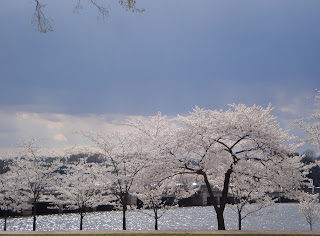"Where have you been, and how has that affected you?"
"Where do you find yourself, and is it where you want to be?"
"Where do you want to go, and will the path you are on get you there?"
This "journey" picture is from the hardest journey I ever took. It's one of the parts of my past
that's still affecting me in ways I can't imagine.
Well, I do know where I've been but I probably can't guess yet at all the ways that has affected and will continue to affect me. And I know where I am, most of the time. I love where I am. Not sure that I'm a fan of DC in general, but I love my school and my church and all of the amazing people here. But as for where I'm going? I have no clue. I think I'm slowly getting used to that, and I'm definitely starting to realize that it's probably for a reason.
See, sometimes I have control issues. Maybe it's because we didn't always have a lot of money growing up, or because my dad has been sick since I was in middle school, or because I was an only child--maybe I just wanted to be able to control something. Or maybe it's just that I'm precocious and stubborn. In any case, I'm not always very good at taking advice. Or letting other people make decisions for me. Even when that other is God and that other knows way more than me.
For example, I still look at myself and see this random assortment of semi-developed skills and wonder, "How am I supposed to cobble together a career out of those?!" Whereas I'm pretty sure God looks at me and says, "Heather! I gave you the perfect set of skills for this thing, or this thing, or even this other thing if you really want to. You'd be amazing at any of them and do great things. Why won't you get with the program already?!" And all the while I sit there, whining and worrying because I don't know what to do with my life.
But the conclusion I've come to this year is that perhaps the reason I don't have a clue what to do anymore is because, if I could see my life laid out, my control issues would come out and I'd say, "But this isn't right!" Or, "But I can't do that!" And I'd screw it up or just run away.
It started with just thinking about how very long it took me to acknowledge the possibility of even doing ministry. The thought that maybe I was called to ministry first occurred to me when I was seven, for goodness’ sake, and it took me over ten years to admit that maybe God really was calling me to ministry despite growing up Southern Baptist, despite being a woman. Even then, though, I’ve realized that I didn’t step out into what that call to ministry could mean. I stuck to what was safe, to what I’d already done: youth ministry. Working with youth in Sunday School, in youth group, and in camp settings all came naturally and I’d been allowed to do it, even as a girl in the Baptist church. I’ve started to feel, then, that what I did was assume that this ministry was what God was calling me to. It was easy. It was safe and familiar. Plus, I liked the idea. Clearly, all of this added up to youth ministry being my call from God. That’s what I decided that I would do. The thought that occurs to me, then, is that maybe youth ministry has just been my first step. Youth ministry was the first thing that I could finally admit to myself as a possibility, the first part of a plan that I can’t see yet.
So in the meantime I blunder along, sometimes listening to God and mostly just doing my own thing. For example, if you remember when I got here I had a minor crisis, way back in my very first entry. Am I here for the right reasons? And if I'm totally honest with myself, the answer is probably no. I came to DC because it was where Jeff was coming, and to Wesley because it was a good seminary here and they offered me a scholarship, and to my church because they offered me a job and seemed like they were doing really great things. But those were my reasons for coming.
That is not to say, though, that there were not other reasons for me being here that I could not see. That little piece of wisdom from a friend still rings true--the awesome thing is that no matter why you go, God can use you anyway. And looking back on this year, with just two more weeks to go, I can definitely see the ways that God has used my place here. Not used me, necessarily. Not in ways that I've seen, anyway. But where I am has affected me in powerful ways. Being in DC and at my amazing church here has rekindled the passion I once had for justice and peace. Being at Wesley has introduced me to truly wonderful people who challenge me every day and has given me the opportunity to explore not only youth ministry but also emerging ministry, which has given me the language to express what I was really yearning for all of those years that I struggled with being called to ministry. Wherever I end up, my ministry is to bring about the kingdom of God begun by Jesus and entrusted to us as Christians, where all people are loved and cared for, where hatred and violence and discrimination have no place. Wherever I go, whatever path I'm on, that is my compass and my goal. That is what I work toward.





















